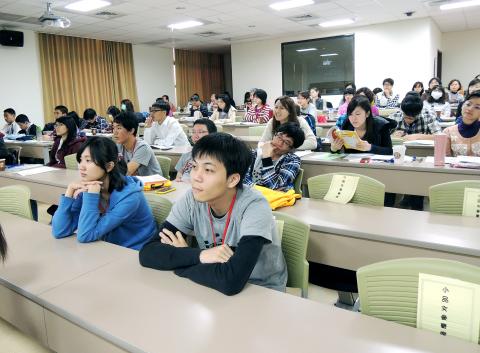Why are students so reticent in class? According to a recent study conducted by researchers from National Taiwan Normal University (NTNU), National Tsing Hua University (NTHU) and Taipei Municipal University of Education (TMUE), students are reluctant about asking questions or responding to questions in the classroom because they fear losing face. The study also found that Taiwanese students are culturally conditioned to learn passively, without asking or answering questions verbally.
NTU professor Fwu Bih-jen says that the advantage of Taiwan’s teaching methods is that students learn by memorizing and practicing, which gives them a firm foundation. This competitive edge is most apparent when looking at how Taiwanese students rank in overall educational performance in international evaluations, including the Trends in International Mathematics and Science Study (TIMSS) and the Programme for International Student Assessment (PISA), Fwu says, adding that this advantage also provides capable talent to the original equipment manufacturing (OEM) sector. For the future, however, she says that Taiwan will need more innovators, people who can think critically and analytically. Taiwanese students typically do not perform as well in areas covering these higher cognitive skills in TIMSS and PISA, which explains why they show less overall proficiency in those areas.
The National Science Council commissioned researchers from NTNU, NTHU and TMUE to study university students in the classroom. The results of the study showed that 83 percent of students were accustomed to recitation and rote learning, while only 28 percent were willing to interact with teachers during class and 36 percent were willing to participate in class discussions and ask questions. The main reason for this paucity of participation is ostensibly because Taiwanese students are generally afraid of losing face and because the majority of their past learning experiences consisted of teachers lecturing without students asking questions during class.

Photo: Tsai Shu-yuan, Liberty Times
照片:自由時報記者蔡淑媛
Wei Chih-fen, head of TMUE’s Department of Psychology and Counseling, says that the more afraid a student is of losing face, the less inclined that student is to answering questions, but that students are much more willing to ask questions in class if they feel confident that they have a worthy question that could gain them affirmation from teachers and students by showing their potential.
(Liberty Times, Translated by Kyle Jeffcoat)
為什麼學生在課堂上總是靜悄悄?原來是怕問到笨問題或答錯問題而「沒面子」!台灣大學師培中心、台北市立教育大學與清華大學共同合作研究發現,我國文化脈絡下的學習模式,「教」的意涵是「上所施,下所效」,不強調提問與回答。
台大教授符碧真表示,我國學習模式的優勢是學生透過記憶及練習,吸收知識,學識基礎扎實,這可從我國學生多次國際學術評比如國際數學與科學成就趨勢調查(TIMSS)及國際學生評量方案(PISA)整體表現優異或可為證,提供了代工所需人力。但未來發展需要創新人才,需要思辨與探究的能力,我國在TIMSS及PISA評比高層次能力表現較差,說明學生這方面的能力較弱。
國科會委託台灣師範大學、清華大學以及台北市立教育大學研究大學生上課情形,發現高達百分之八十三的大學生修課經驗是「記誦與練習」,只有百分之二十八的學生願意在課堂上與老師互動,百分之三十六願意參與課堂討論與發問,主要原因是台灣學生愛面子,且過去的學習經驗多半是老師單方面教授知識,學生沒有在課堂上發言的習慣。
台北市立教育大學心理與諮商學系主任危芷芬表示,學生愈擔心面子問題,回答意願就越低,但若覺得問出好問題,能展現自己潛能獲老師與同儕肯定,回答意願就愈高。
(自由時報記者湯佳玲)

For many people in Taiwan, childhood memories of rural life include pig pens standing beside family homes. Leftover rice, vegetable scraps and soup from daily meals were poured into buckets and fed to pigs. This practice of feeding pigs with household food waste was once a common way of life, both an economic choice and an expression of agricultural society’s deep respect for conserving resources. From a practical standpoint, pigs are omnivorous animals capable of efficiently digesting food scraps that humans can no longer eat. For rural households, food waste cost almost nothing, yet it could be converted into pork, a

A: Apart from the Taipei Music Center’s exhibit and concert, US pop rock band OneRepublic and rapper Doja Cat are touring Kaohsiung this weekend. B: OneRepublic is so popular that after tonight’s show at the K-Arena, they are set to return to Taiwan again in March next year. A: And Doja will also perform at the same venue on Sunday, right? B: Yup. Her collab with Blackpink’s Lisa and singer Raye for the song “Born Again” has been a huge worldwide success. A: Doja even made it on Time magazine’s “100 Most Influential People” list in 2023. She’s so cool. A: 本週末除了北流的特展和演唱會外,美國男團共和世代和饒舌歌手蜜桃貓朵佳也將來台開唱。 B: 共和世代因太受歡迎,繼今晚高雄巨蛋的演唱會後,預計明年3月即將再度來台巡演唷。 A: 朵佳本週日將在同場地開唱,對不對?

Tango unfolds in a dimly lit room, where a haunting melody ushers two dancers into a close embrace. Here, music and movement merge into a silent yet passionate conversation, expressing longing, memory and shared purpose. What makes tango truly magical is the deep interaction and spontaneous improvisation between partners. Tango began in the late 19th century in Buenos Aires, Argentina’s bustling capital. Born in the poor working-class neighborhoods and busy port areas, this dance emerged from a melting pot of cultures. European immigrants, African slaves and local residents all contributed to its unique character. From these rich influences, tango

A: What show are you watching online? B: I’m watching “Fly Me to the Moon & Back” – an exhibition launched by the Taipei Music Center (TMC) to commemorate the late singer Tom Chang. A: Known for his sky-high notes, Chang is praised as one of the best singers in the 1990s. His death at the age of 31 was a major loss indeed. B: And I’m so glad that we went to the TMC’s 90s-themed concert last Friday. I finally saw the iconic “Godmother of Rock” WaWa perform live. A: This year-end show also featured singers Princess Ai, Bii, Wayne Huang, PoLin and